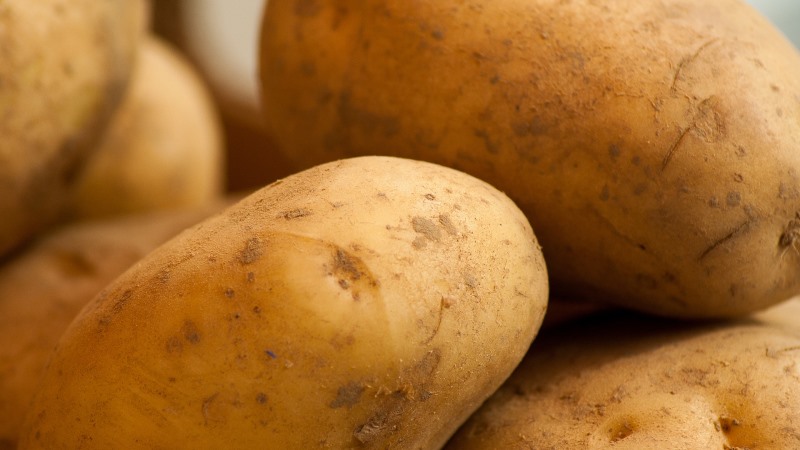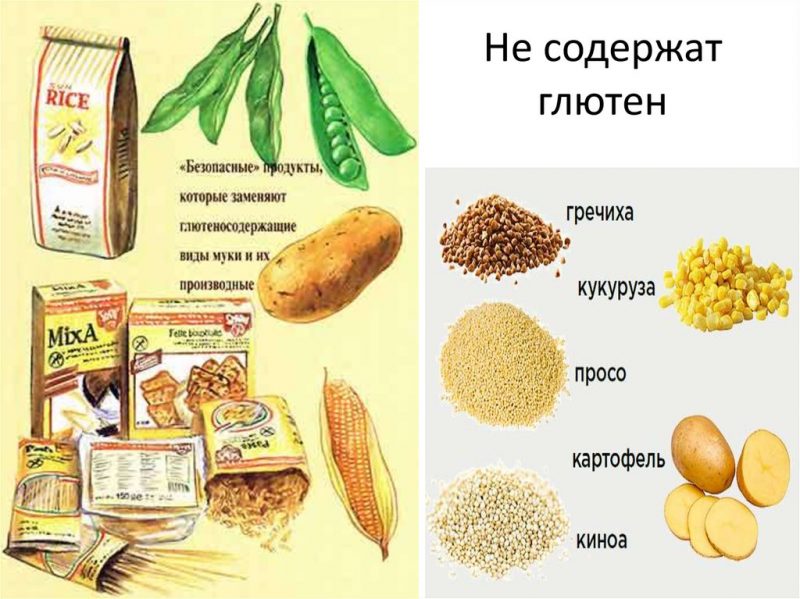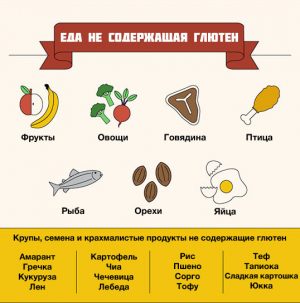Beware, terrible gluten: is it in potatoes or not
We use the word "gluten" almost every day, and most often with the prefixes of the negation "no" and "not": gluten-free product, gluten-free diet, gluten-free baby food, gluten-free.
Why is gluten so terrible that people are in a hurry to give it up? What foods contain? And is it in your favorite potatoes? You will find detailed answers to these questions in the article.
The content of the article
Chemical composition, trace elements and beneficial properties of potatoes
The chemical composition, macro- and microelements of potatoes make it useful for humans.
The table clearly shows the composition of the tubers:
| Vitamins | PP, A, B1, B2, B5, B6, B9, C, E, H and beta-carotene |
| Macronutrients | Calcium, magnesium, sodium, potassium, phosphorus, chlorine, sulfur |
| Trace elements | Iron, zinc, iodine, copper, manganese, selenium, chromium, fluorine, molybdenum, boron, vanadium, cobalt, lithium, aluminum, nickel, rubidium |
The nutritional value of 77 kcal per 100 g of potatoes consists of proteins, fats, carbohydrates, dietary fiber, organic acids, starch, ash, saturated fatty acids, mono- and disaccharides. Starch helps a person quickly get enough of potatoes. Its content in 100 g of the product is from 13 to 36.8%, depending on the variety.
Reference. The basis of potatoes is not carbohydrates, but water. Its content in 100 g of the product is 78.6 g.
The beneficial properties of potatoes will not be lost if they are boiled (without boiling), baked and eaten without sauces and bread, in their pure form.
When consumed raw, beneficial substances are concentrated in tubers, therefore they are used for medicinal purposes.
For example, rinse your mouth with potato juice. This normalizes the acid-base balance in the oral cavity. Compresses for the eyes are made from grated potatoes - they relieve tension. A decoction of potatoes is used for high blood pressure, joint disease and insomnia.

What foods contain gluten
Gluten is the name of a group of proteins found in the seeds of cereals. About 20 years ago it was called gluten. In its pure form, gluten is similar to a powder, but when diluted with water it forms a thick mass similar to glue.
Gluten is poorly and slowly digested by the stomach, and passing through the intestines, like a razor, removes all the villi that help the absorption of beneficial substances. A person begins to have diarrhea, bloating, and as a result, immunity suffers.
Gluten is found in grains such as rye, wheat, barley and oats. They are used to prepare the basis for many products:
- bakery products, flour and flour-based products
- minced meat, sausages;
- cereal-based beverages such as beer, whiskey and vodka;
- chocolate;
- sauces, mayonnaise, ketchups.
Products with hidden gluten:
- sweets and ice cream;
- breakfast cereals;
- ready-made instant soups;
- semi-finished rice products with seasonings and spices;
- purchased fries;
- crab sticks;
- crisps.
Is there gluten in potatoes and how much
When asked if potatoes contain gluten or not, the answer is unambiguous - does not contain. Do not believe me, let us prove by examples.
Are potatoes gluten-free?
 To detect gluten in foods, an experiment is conducted. Gluten on contact with iodine changes its color to a dark blue or black hue. If you drop iodine on raw potatoes, it will turn into these colors.But not due to the gluten content, but due to the fact that the potatoes contain starch. It is he who changes the color of iodine. Potatoes are not cereals, and they cannot contain gluten.
To detect gluten in foods, an experiment is conducted. Gluten on contact with iodine changes its color to a dark blue or black hue. If you drop iodine on raw potatoes, it will turn into these colors.But not due to the gluten content, but due to the fact that the potatoes contain starch. It is he who changes the color of iodine. Potatoes are not cereals, and they cannot contain gluten.
In potatoes, gluten appears exclusively during cooking. For example, french fries are cooked in a pot that has residues of gluten on it. Or you eat potatoes with a prepared sauce that has gluten in it.
Is there gluten in potato starch?
Potato starch Is a soft white substance without taste or taste. It is produced by special processing of potatoes.
A tablespoon of potato starch contains 40 kcal: carbohydrates - 10 g, protein, fat, fiber - 0 g. When starch is made from potatoes, gluten does not appear there in any way, because potatoes are not cereals.
Why is it suspected that potato starch contains gluten? Because of its properties. Starch is added in the preparation of sauces, jelly, soups to thicken them. The consistency of the product is the same as when cooking with gluten-containing ingredients.
Read also:
Beware of gluten: does barley contain it?
Dangerous gluten: is it in oats?
Why is gluten harmful and what is the benefit of it?
Humanity is familiar with gluten from the moment people began to use cereal grains for making buns and bread. And the beneficial properties of gluten have been used for a long time.
Why is there anti-propaganda of gluten in our time, why is it so harmful to human health?
Why celiac disease is dangerous
Celiac disease - celiac disease - is caused by gluten intolerance and is caused by a congenital or acquired deficiency of one of the intestinal juice enzymes. It is an autoimmune disease. What triggers it is still not clear.
In celiac disease, the lining of the small intestine cannot completely break down gluten proteins. Only part of the nutrients gets into the body. Undivided fractions are also absorbed through the intestines, but at the same time they poison the body.
How celiac disease manifests itself: first, diarrhea and flatulence appear. If the correct diagnosis is not made in time, depletion, hypovitaminosis and anemia, impaired mineral and water-salt metabolism, iron deficiency anemia, and osteoporosis develop. Against this background, immunity decreases, a person suffers from colds up to 6-7 times a year.
If the disease is not treated, changes in the psyche occur in adults, and developmental delays are observed in children.
Important! Insidious celiac disease is disguised as gastrointestinal diseases, dermatitis and even neurosis. Diagnosing this disease is not easy.
What experts say about gluten
 There is a rumor among the people that almost every person has a gluten intolerance to one degree or another due to the genetically modified cereals that grow in our fields.
There is a rumor among the people that almost every person has a gluten intolerance to one degree or another due to the genetically modified cereals that grow in our fields.
However, in 2013, a study was published in the journal Agriculture and Food Chemistry, which claims that gluten did not increase throughout wheat breeding. Professor Donald Kasarda, Chicago, USA, argues that genetically modified wheat with increased gluten content has not been grown anywhere in the world since its introduction on earth.
But what conclusions about gluten is made by Vladislav Liflyandsky, professor, doctor of medical sciences, author of 18 books and 80 articles on nutrition:
- The harm of gluten is partly a publicity stunt. There are only 1% of people with total gluten intolerance on our planet. They eliminate gluten from their diet for life. Another 2-3% of people have a relative reaction to this protein. They limit the use of gluten for a while - it is determined by the doctor. Everyone else can eat their favorite bakery products without fear of allergies, no matter how advertised.
- If manufacturers remove gluten from the composition, for example, buns, then add fat and baking powder there so that the product retains its shape and does not fall apart during baking. And to improve the taste, sugar is also added. The calorie content of a gluten-free product is increased.
- Do not remove gluten yourself from your diet. Its absence can lead to a deficiency of iron, calcium and B vitamins.
- Healthy babies are given gluten-containing foods from 4-6 months. Introduce 1 product and monitor the baby's condition. If this food has caused diarrhea, rash, bloating, constipation, consult a doctor to find out the reasons for the reaction. The risk is increased if someone in the family has gluten intolerance.
- Gluten-free cosmetics are said to be non-allergenic and skin-friendly. The company produces gluten-free shampoos, hair masks, and decorative cosmetics. Salons offer the service of applying gluten-free makeup. All this is nothing more than a publicity stunt. Gluten is a high molecular weight protein, it cannot penetrate the skin and cause allergies.
- Gluten does not increase the risk of cancer, cardiovascular disease, diabetes or other diseases. It can exacerbate these diseases in celiac patients who do not follow a gluten-free diet.
How to know if you have the same gluten intolerance
It is definitely worth checking yourself for gluten intolerance if the family suffers from or suffered from celiac disease. First of all, they check children whose relatives are sick with it. This will help you get the right diet for them.
To diagnose gluten intolerance, test for Ig G3 and G4 for gluten and other grain proteins.
To confirm the diagnosis, an elimination (gluten-free) diet is established for eight weeks. If after it diarrhea, bloating, the skin becomes cleaner, the nerves are not naughty, then products with gluten are contraindicated for you.
For adults, a colonoscopy with a biopsy is performed: an area with affected villi is captured. When examining them, submicroscopic intestinal lesions are found.
Attention! If you have not been diagnosed with celiac disease, this does not mean that you will never get it. The disease develops rapidly against the background of life stresses, infectious diseases and other negative factors.
Conclusion
Gluten is only dangerous for those with a predisposition to celiac disease. For such people, foods with gluten are excluded from the diet for the rest of their lives. At the same time, potatoes in the diet remain boiled or baked. After all, potatoes are not cereals, they do not contain gluten, just like potato starch. Everyone's diet should be balanced, and gluten is an integral part of it. It makes no sense for a healthy person to give up potatoes and deprive themselves of iron, calcium and vitamins that they contain.